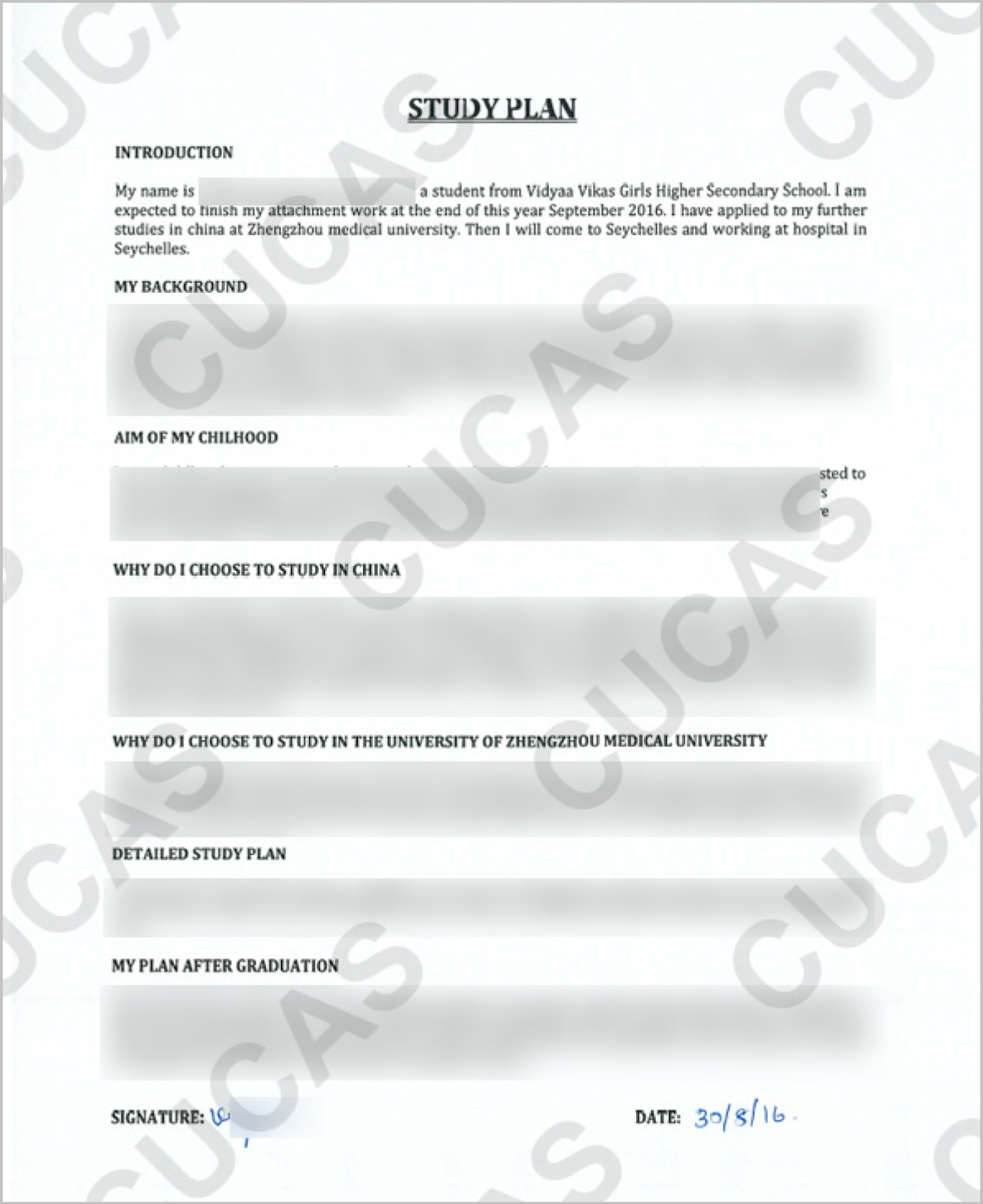【Study Plan for Chinese University Application】Guidance From Real Chinese: How Do Undergraduate Applicants Write It Well?
Study Plans, or Personal Statements, both are necessary when international students applying for most Chinese universities. I have searched some articles on Google about how to write a Chinese University Study Plan, but none of them satisfies me, and some are even nonsense. So I decided to explain it by myself to show you what kind of Study Plan/Personal Statement that Chinese teachers prefer to read.
I forgot to introduce myself that I am Chinese, worked for International Education College in Chinese universities before and my major was administrative management when I was a student, thus official document writing is my strong point. And I am currently a professional admission counselor with 4 years of industry experience.
If you are applying for Chinese Universities’ bachelor courses, and want to write a good Study Plan/Personal Statement, then keep reading and you will know how to do it well within 5 minutes.
# Does the Study Plan Play an Important Role When Applying for Chinese Universities?
# What’s the Difference Between Study Plan, Personal Statement, and Research Proposal?
# What Can be Included in the Study Plan?
# What Kind of Study Plan Does the Admissions Teacher Like Best?
# 9 Steps to Complete a Study Plan
# Does the Study Plan Play an Important Role When Applying for Chinese Universities?
For undergraduate applicants, the key factor for entering a Chinese university is whether their high school grades and language level meet the admission requirements of the University. If your academic performance is far from the requirements of the school, even if you write a perfect Study Plan, it may not help. However, between two candidates of a similar level, whoever has a better Study Plan or relevant documents will stand out in the competition. The Study Plan is a common and non-ignorable document when applying for Chinese universities, but we don’t need to worry about it and just believe that as long as we master the main points of writing it, we can easily write a better Study Plan than others in a shorter time.
At the same time, I would like to say that writing a Study Plan is not only to output an assignment or complete a requirement, but more importantly, you can have the opportunity to seek your heart while working on it, which is a precious opportunity to talk to yourself. Am I really ready to study in China? Is this major really what I want? Imagining the future and making plans for yourself is not only a romantic thing, but also the beginning of self-independence and self-responsibility. As long as it really triggers thinking while writing Study Plan, then it is of great significance.
Therefore, in this part, my only suggestion is to write your own Study Plan seriously and never think about copying the work of others. Two high school students who were neighbors asked me to help them apply for MBBS courses in China, but their Study Plan was found to be almost the same by the admission teacher, resulting in their application being returned. Their behavior almost made them lose a good offer but fortunately, as a reliable agent, I communicated with the teacher for a long time and won them a chance to resubmit. What I want to say is that when facing Chinese teachers, respect, politeness, and honesty are the most basic etiquette. Never try to escape and lie.
# What’s the Difference Between Study Plan, Personal Statement, and Research Proposal?
The Research Proposal is the most serious, difficult document with the highest academic value among all the documents when applying for a postgraduate degree. The supervisors will judge whether the students have the potential to engage in scientific research in subdivided fields through the Research Proposal. These abilities include knowledge mastery, literature reading, and understanding, scientific research thinking, English writing ability, etc. The Research Proposal is generally composed of Title, Background, Literature Review, Research Gap, Research Question, Research Aim, Research Method, Expected Results, Time Plan, and so on. Undergraduate applicants are usually not required to write Research Proposals as high school graduates generally are too young to have such ability.
A personal Statement is also called a Motivation Letter in some countries. In terms of content, you can describe your background, ability, interest, experience, goal, the reason for applying for a major in a certain school, career planning, etc. in your Personal Statement. Study Plan can also contain these contents, but what’s more important is that a Study Plan states in detail what you are going to do if your application is accepted by your target university or with the scholarship. The Study Plan focuses more on the “plan”, which does not need too many personalized and emotional expressions. Making it maintain a clear and concise structure, strict logic, and with fully credible reasons is enough. What’s more, we should reasonably arrange the writing structure of the Study Plan, which means in an article with a limited number of words, we should make the word of the specific learning plan more than the space under any other themes. For example, we can't use 60% to describe our experience, only 20% to describe the specific learning plan, and the remaining 20% to describe all other contents. Instead, we should use the main space to describe the specific learning plan, followed by other aspects.
# What Can be Included in the Study Plan?
Your Study Plan can consist of the following topics:
1). Self-introduction: Who are you? How old are you? Which country are you coming from? Where did you graduate from? What major do you want to apply for? ...
2). Personal background introduction: What learning experiences and insights have you had before? What abilities have you got from your experience? Source of funds for studying abroad, family background, and income? What advantages do you have? Why should the school choose you?
3). Why do you choose to study in China: What do you know about China? What do you think of studying in China? What do you know about international education in China?
4). Why do you choose to study this major in this university: Why do you choose this major? How do you know about this university? What do you expect from this university? Here, I need to remind you that if you wanna apply to multiple universities at the same time, then do not forget to modify the content of this part according to the corresponding schools.
5). Detailed study plan in China: If you can successfully come to the school, how will you plan your study life? What are your preparations for learning and living in China? What are you going to do in the first academic year in China? What are you going to do in the second, third, and fourth-year? Do remember that this part should be the focus of your Study Plan, please.
6). Plan after graduation: What are you going to do after graduation? What are your career plans? What are your interests and goals?
# What Kind of Study Plan Does the Chinese Admissions Teacher Like Best?
1). Language & Form:
At present, most Chinese universities have not put forward specific standardized requirements for undergraduate Study Plans. If it must be mentioned, for general programs application, the unified format of the Study Plan should be written in Chinese or English. For ease of reading, it should be non-handwritten.
2). Space Requirements:
If the university you are applying for has a clear word number requirement for the Study Plan, you should strictly abide by it. For example, if your university requires a study plan of no less than 800 words, then I suggest that the number of words in your study plan should be between 800-1000 words. If your university requires a study plan of no less than 400 words, I suggest your study plan be between 400-800 words. Too little space will show an improper attitude, and it is difficult to express the content completely. Too much space will cause an additional work burden to teachers. If your school does not have any requirements for the number of words, it is recommended that your content be between 400-1000 words.
3). Paragraph:
One or two paragraphs are enough to explain a topic, and it is better to add a simple subheading before the paragraph, such as My Choice of Peking University in China, My Career Objective, and My Advantages, etc. This will help the admission teacher to know you in a fast time.
4). Writing Style:
In addition to making the expression organized and logical, you’d better use concise and comprehensive language, reducing the use of obscure words.
5). English Writing Format:
Finally, I would like to emphasize the English writing format. Most of the high school students who apply to Chinese universities use English to write their Study Plans, but many students are not native English speakers. Therefore, I can understand that why there are many problems with some students' learning plans in English. When I helped a student revise his Study Plan, I found that there was no space after all his punctuation, but a space left before all the punctuation. In addition, his upper and lower case letters are also confused. In terms of paragraph formats, for Study Plan or Personal Statement, we suggest that leave no space at the beginning of the paragraph, and a blank line between paragraphs should be left. As for more English writing standards, please search on Google. In addition, Microsoft Word is suggested as the editing tool, and Time New Roman or Arial is suggested as a font choice.
Never ignore your English and writing format. If your Study Plan is an unknown promise, your English ability and format knowledge can be immediately identified. If an admissions teacher finds that a student's Study Plan is full of spelling errors, grammatical errors, and in a non-standard writing format, how can he believe that you have good English ability to learn undergraduate courses taught in English?
# Writing Steps
1). Confirm the title and number of words: Do not modify the title and the number of words given by the school at will. If the school wants a Personal Statement, you just need to title your writing as Personal Statement, don’t name it something like a CV or Application Statement.
2). Design the article structure/subtitle/paragraph words
3). Fill in the text of each paragraph with a reasonable number of words
4). Read through and modify the full text to be better and smooth
6). Modify format: text size, font, spacing, blank lines, etc.
7). Save your file as PDF and print it out
8). Sign your name and date by hand
9). Scan the file, name the file, and submit it to the school
Of course, the above remarks are only aimed at the current situation of Chinese universities' applications. With the continuous improvement of China's international education level and the increase of the competitiveness of Chinese universities application, the functionality and influence of undergraduate applicants' Study Plan will become greater, and the requirements of colleges/universities for Study Plan will become more and more standardized, specific, internationalized. I hope I will continue to update my series of articles about Chinese university application documents by that time and help more students come to study.
- Submitted at Sep 18, 2021
- ( 9569 Views)
- Category Certification
Articles You May Interest in
Related Questions
- May I know how to write the Study Plan or Research Proposal well before applying CSC? 1 Answer
- How to write academic Research Proposal /Study Plan? 4 Answers
- What is the study plan? 2 Answers
- Is there a word limit for study plan or research plan? 6 Answers
- Is there a word limit for the personal statement of MBBS program in Fudan University? 1 Answer
- How to write a Study Plan or Research Proposal? 5 Answers
